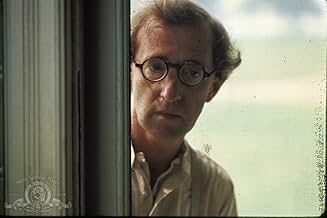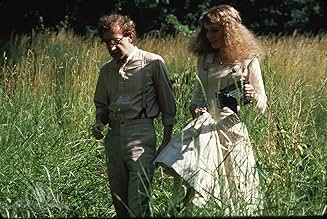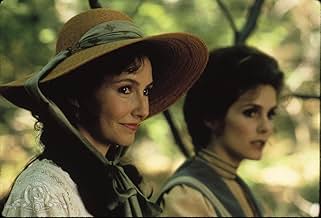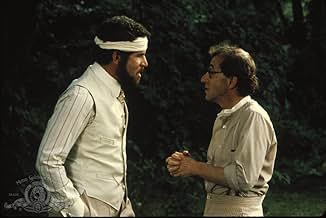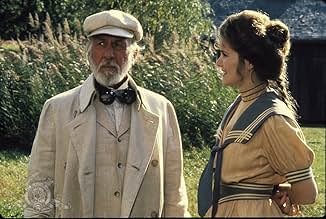Sonhos Eróticos de uma Noite de Verão
Título original: A Midsummer Night's Sex Comedy
AVALIAÇÃO DA IMDb
6,6/10
22 mil
SUA AVALIAÇÃO
Adicionar um enredo no seu idiomaIn the early 20th century, wacky inventor Andrew Hobbs and his wife Adrian invite two other couples for a weekend party at their romantic summer house in the countryside in this paean to Ing... Ler tudoIn the early 20th century, wacky inventor Andrew Hobbs and his wife Adrian invite two other couples for a weekend party at their romantic summer house in the countryside in this paean to Ingmar Bergman's Smiles of a Summer Night.In the early 20th century, wacky inventor Andrew Hobbs and his wife Adrian invite two other couples for a weekend party at their romantic summer house in the countryside in this paean to Ingmar Bergman's Smiles of a Summer Night.
- Direção
- Roteirista
- Artistas
- Prêmios
- 1 indicação no total
José Ferrer
- Leopold
- (as Jose Ferrer)
Sandy Biano
- Nurse
- (não creditado)
Caitlin O'Heaney
- Dolores Farrar
- (não creditado)
Avaliações em destaque
When I look at his filmography on this site and count the films I consider great from the 70s till the early 90s I only stumble over two or three entries I am not fond of. Granted, some are greater than others, but Woody Allen essentially created consistently excellent films for two decades. Whether comedy or drama, whether set in New York or elsewhere, his films are not only great American films, but they belong in the international arena of film art.
Having said all that, and hopefully having disclosed my own bias in discussing the man's work, I can say without further ado that I loved "A Midsummer Night's Sex Comedy." It is hardly the type of Woody Allen film that would receive dozens of critical accolades and nominations (in fact it was only nominated for a Razzie), but I think that can be explained by the fact that Woody Allen set a bar of expectation for himself. When you watch "Manhattan" or "Crimes and Misdemeanors" and then this you see a change of pace, a sort of lighter tone. That does not, however, mean that this film is without its merits. Taken strictly as a film, not as a Woody Allen film, it is plain wonderful. I think that goes for most of his films (except maybe some of the more recent ones).
Allen, of course, is up to his usual tricks again - he takes a Bergman film ("Smiles of a Summer Night") and spoofs it, makes it his own and I think successfully. The atmosphere of this film is what makes it so watchable - the beautiful blend of humor, nostalgia and unfulfilled desire, which I think he perfected in "Radio Days," come through exquisitely. It's also an interesting move away from the stark atheism, or at least agnosticism of his earlier films - the presence of spirits, shadows and ghosts, things unexplained by science, unaccounted for by our sentient experience.
The most interesting aspect of it is that this mystical theme is hardly incongruous with Allen's other films, including his tragedies. Whether his films underline the hopelessness of existence (like "Interiors") or the mystical, and thus hopeful nature of human relationships, they only differ by the mood the storyteller is in when he speaks of them.
Here we have an entirely Shakespearean comedy full of criss-crossing love affairs, absurd relations, untamed desires all leading to hilarious revelations, or serious revelations under the most comic circumstances. Jose Ferrer is remarkable as Professor Leopold, a cold, atheistic intellectual, an accomplished thinker and professor. Contrary to his character, Allen bestows him with some of the funniest lines in the entire film. For example, when he realizes that his marriage to Mia Farrow's Ariel will be the end of his bachelorhood and that he is attracted to Julie Hagerty's nurse Dulcy, he attempts to compliment Dulcy over a game of chess. He says: "You have a wonderful flair for spatial relationships." These little speeches are completely in line with the comic absurdity of the whole, like Tony Robert's Maxwell, a romantic doctor who, gets shot not once, but twice in the film (once for love and once for revenge {meant for someone else}, nonetheless), or Woody Allen's stockbroker / inventor Andrew.
There is such joy in this film, such passion. Yes, maybe "Radio Days" is more articulate and personal on the subject, maybe "Crimes and Misdemeanors" is one of his best tragedies, "Manhattan" one of my favorite of his films along with "Hannah and Her Sisters" and "Another Woman." And, while "A Midsummer Night's Sex Comedy" is not as great, in my humble opinion, as the aforementioned films, it is still a great film, if that makes any sense.
Having said all that, and hopefully having disclosed my own bias in discussing the man's work, I can say without further ado that I loved "A Midsummer Night's Sex Comedy." It is hardly the type of Woody Allen film that would receive dozens of critical accolades and nominations (in fact it was only nominated for a Razzie), but I think that can be explained by the fact that Woody Allen set a bar of expectation for himself. When you watch "Manhattan" or "Crimes and Misdemeanors" and then this you see a change of pace, a sort of lighter tone. That does not, however, mean that this film is without its merits. Taken strictly as a film, not as a Woody Allen film, it is plain wonderful. I think that goes for most of his films (except maybe some of the more recent ones).
Allen, of course, is up to his usual tricks again - he takes a Bergman film ("Smiles of a Summer Night") and spoofs it, makes it his own and I think successfully. The atmosphere of this film is what makes it so watchable - the beautiful blend of humor, nostalgia and unfulfilled desire, which I think he perfected in "Radio Days," come through exquisitely. It's also an interesting move away from the stark atheism, or at least agnosticism of his earlier films - the presence of spirits, shadows and ghosts, things unexplained by science, unaccounted for by our sentient experience.
The most interesting aspect of it is that this mystical theme is hardly incongruous with Allen's other films, including his tragedies. Whether his films underline the hopelessness of existence (like "Interiors") or the mystical, and thus hopeful nature of human relationships, they only differ by the mood the storyteller is in when he speaks of them.
Here we have an entirely Shakespearean comedy full of criss-crossing love affairs, absurd relations, untamed desires all leading to hilarious revelations, or serious revelations under the most comic circumstances. Jose Ferrer is remarkable as Professor Leopold, a cold, atheistic intellectual, an accomplished thinker and professor. Contrary to his character, Allen bestows him with some of the funniest lines in the entire film. For example, when he realizes that his marriage to Mia Farrow's Ariel will be the end of his bachelorhood and that he is attracted to Julie Hagerty's nurse Dulcy, he attempts to compliment Dulcy over a game of chess. He says: "You have a wonderful flair for spatial relationships." These little speeches are completely in line with the comic absurdity of the whole, like Tony Robert's Maxwell, a romantic doctor who, gets shot not once, but twice in the film (once for love and once for revenge {meant for someone else}, nonetheless), or Woody Allen's stockbroker / inventor Andrew.
There is such joy in this film, such passion. Yes, maybe "Radio Days" is more articulate and personal on the subject, maybe "Crimes and Misdemeanors" is one of his best tragedies, "Manhattan" one of my favorite of his films along with "Hannah and Her Sisters" and "Another Woman." And, while "A Midsummer Night's Sex Comedy" is not as great, in my humble opinion, as the aforementioned films, it is still a great film, if that makes any sense.
When I saw this film I thought it was from Allen's early period and I thought of it as a prototype Manhattan but when I checked the chronology I discovered that it belongs to his middle period and postdates both Annie Hall and Manhattan. It really is like Manhattan set in the woods of New England. As far as I can see, it is his first film with Mia Farrow and his camera is besotted with her as are all the male characters in the film. Mary Steeburgen also looks good although I can never work out whether she really can act or whether she is just having trouble with her contact lenses. The scenes of New England are beautifully shot and are ravishing to look at. I thought the element of mysticism sat uneasily with the rest of the film.
This film is said to be Allen's take on the Bergman film Three Smiles of a Summer Night although I cannot comment on this because I last saw the Bergman film 35 years ago at a student film society. Maybe the mystical element in Allen's film is lifted from Bergman. There are also obvious parallels with A Midsummer Night's Dream with the mortals swapping partners and with spirits flitting about in the woods. In keeping with the subject matter, Allen uses Mendelssohn for the incidental music rather that his usual classic jazz numbers.
This film is said to be Allen's take on the Bergman film Three Smiles of a Summer Night although I cannot comment on this because I last saw the Bergman film 35 years ago at a student film society. Maybe the mystical element in Allen's film is lifted from Bergman. There are also obvious parallels with A Midsummer Night's Dream with the mortals swapping partners and with spirits flitting about in the woods. In keeping with the subject matter, Allen uses Mendelssohn for the incidental music rather that his usual classic jazz numbers.
I thought this was really quite good. Had not seen before as is never really mentioned or advertised. Particularly enjoyed Julie Hagerty's performance. I don't know why she has not been a bigger star and more used in films. Her timing and line delivery is very funny. Jose Ferrer also excellent at his pompous best. Mia farrow and Mary Steenbergen both look lovely in the summer drenched locations, that look like one of Englands Southern Shire Counties! Perhaps not Woody Allens best, but as he apparently 'hates' the country side, some gorgeous scenes filmed by Gordon Willis. I have given this a '7'rating, and would certainly recommend to all.
While this movie is not considered to be one of Woody Allen's masterworks, the sight of him in the countryside he so feared in Annie Hall and Manhattan, surrounded by crickets, rabbits, frogs and wild mushrooms, is a funny one, especially for his fans. Shakespeare was clearly on Allen's mind when he made and titled this movie--not only A Midsummer Night's Dream, but also The Tempest. There are obvious references (Mia Farrow's character's name is Ariel), and more subtle ones in the dialogue, when Woody's character talks about a "half goat" mystical lover. The film also marks Allen's first union with Mia Farrow, and the two work wonders together here which would be proved in several subsequent films (it's quite sad that their off-screen relationship ended the way it did). It is beautifully filmed and Allen uses music as effectively as he did in Manhattan. There are not a lot of belly laughs or memorable one-liners, but it is fun to watch nevertheless, and everyone in his ensemble cast seems to be having a great time.
Cute and charming, if not really much more.
Gordon Willis's photography is nowhere near as amazing as his earlier collaborations with Woody, and the film doesn't have any wildly funny moments.
But the writing is witty, and the acting solid if not triumphant. It just doesn't feel like a Woody Allen film somehow. More like a nice, solid, unassuming French farce.
That's not a bad thing, and this film is still better than 99% of what comes out of Hollywood, with a sweeter, more upbeat tone than usual for Allen. It's just coming on the heels of masterpieces like 'Annie Hall', 'Manhattan', and 'Stardust Memories', and just before other great films like 'Zelig' and 'Purple Rose of Cairo', it can't help but pale a bit in comparison.
Gordon Willis's photography is nowhere near as amazing as his earlier collaborations with Woody, and the film doesn't have any wildly funny moments.
But the writing is witty, and the acting solid if not triumphant. It just doesn't feel like a Woody Allen film somehow. More like a nice, solid, unassuming French farce.
That's not a bad thing, and this film is still better than 99% of what comes out of Hollywood, with a sweeter, more upbeat tone than usual for Allen. It's just coming on the heels of masterpieces like 'Annie Hall', 'Manhattan', and 'Stardust Memories', and just before other great films like 'Zelig' and 'Purple Rose of Cairo', it can't help but pale a bit in comparison.
Você sabia?
- CuriosidadesJosé Ferrer found himself the object of a practical joke while making this film. Dustin Hoffman visited the set while made up as Dorothy Michaels in the film Tootsie (1982), and proceeded to make sexual advances on Ferrer, who politely refused--but was completely unaware that Hoffman was not in fact a woman.
- Erros de gravaçãoAbout thirteen minutes into the movie, a crew member is visible crouched by a tree, as a deer runs through the woods.
- Trilhas sonorasSymphony No. 3 (Scottish) in A Minor
Written by Felix Mendelssohn (as Mendelssohn)
Performed by Leonard Bernstein and the New York Philharmonic (as New York Philharmonic Orchestra)
Courtesy of CBS Records
Principais escolhas
Faça login para avaliar e ver a lista de recomendações personalizadas
- How long is A Midsummer Night's Sex Comedy?Fornecido pela Alexa
Detalhes
- Data de lançamento
- País de origem
- Idiomas
- Também conhecido como
- Comedia sexual de una noche de verano
- Locações de filme
- Empresas de produção
- Consulte mais créditos da empresa na IMDbPro
Bilheteria
- Faturamento bruto nos EUA e Canadá
- US$ 9.077.269
- Fim de semana de estreia nos EUA e Canadá
- US$ 2.514.478
- 18 de jul. de 1982
- Faturamento bruto mundial
- US$ 9.077.269
Contribua para esta página
Sugerir uma alteração ou adicionar conteúdo ausente

Principal brecha
What is the Brazilian Portuguese language plot outline for Sonhos Eróticos de uma Noite de Verão (1982)?
Responda


